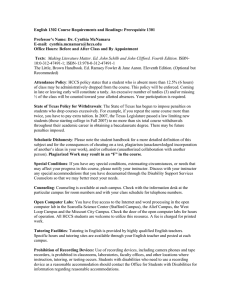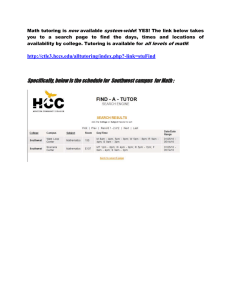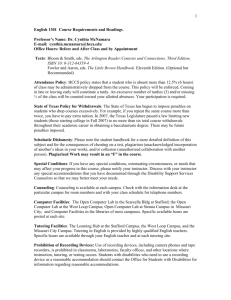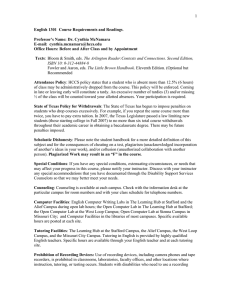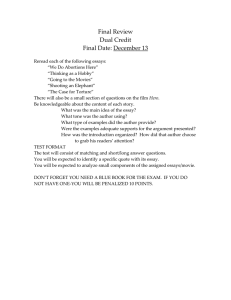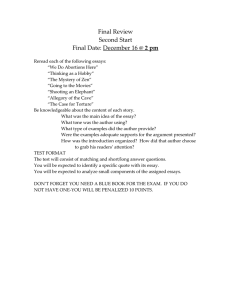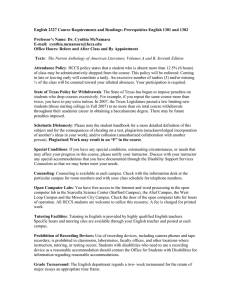1301.Syll.F.11.doc
advertisement
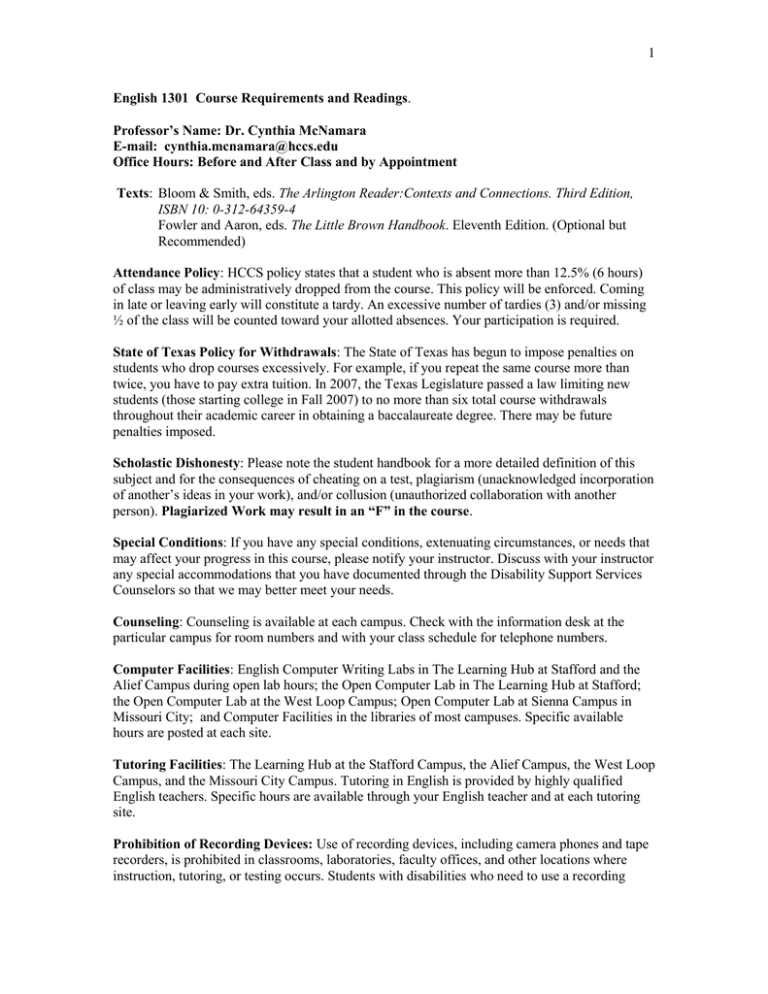
1 English 1301 Course Requirements and Readings. Professor’s Name: Dr. Cynthia McNamara E-mail: cynthia.mcnamara@hccs.edu Office Hours: Before and After Class and by Appointment Texts: Bloom & Smith, eds. The Arlington Reader:Contexts and Connections. Third Edition, ISBN 10: 0-312-64359-4 Fowler and Aaron, eds. The Little Brown Handbook. Eleventh Edition. (Optional but Recommended) Attendance Policy: HCCS policy states that a student who is absent more than 12.5% (6 hours) of class may be administratively dropped from the course. This policy will be enforced. Coming in late or leaving early will constitute a tardy. An excessive number of tardies (3) and/or missing ½ of the class will be counted toward your allotted absences. Your participation is required. State of Texas Policy for Withdrawals: The State of Texas has begun to impose penalties on students who drop courses excessively. For example, if you repeat the same course more than twice, you have to pay extra tuition. In 2007, the Texas Legislature passed a law limiting new students (those starting college in Fall 2007) to no more than six total course withdrawals throughout their academic career in obtaining a baccalaureate degree. There may be future penalties imposed. Scholastic Dishonesty: Please note the student handbook for a more detailed definition of this subject and for the consequences of cheating on a test, plagiarism (unacknowledged incorporation of another’s ideas in your work), and/or collusion (unauthorized collaboration with another person). Plagiarized Work may result in an “F” in the course. Special Conditions: If you have any special conditions, extenuating circumstances, or needs that may affect your progress in this course, please notify your instructor. Discuss with your instructor any special accommodations that you have documented through the Disability Support Services Counselors so that we may better meet your needs. Counseling: Counseling is available at each campus. Check with the information desk at the particular campus for room numbers and with your class schedule for telephone numbers. Computer Facilities: English Computer Writing Labs in The Learning Hub at Stafford and the Alief Campus during open lab hours; the Open Computer Lab in The Learning Hub at Stafford; the Open Computer Lab at the West Loop Campus; Open Computer Lab at Sienna Campus in Missouri City; and Computer Facilities in the libraries of most campuses. Specific available hours are posted at each site. Tutoring Facilities: The Learning Hub at the Stafford Campus, the Alief Campus, the West Loop Campus, and the Missouri City Campus. Tutoring in English is provided by highly qualified English teachers. Specific hours are available through your English teacher and at each tutoring site. Prohibition of Recording Devices: Use of recording devices, including camera phones and tape recorders, is prohibited in classrooms, laboratories, faculty offices, and other locations where instruction, tutoring, or testing occurs. Students with disabilities who need to use a recording 2 device as a reasonable accommodation should contact the Office for Students with Disabilities for information regarding reasonable accommodations. Grade Turnaround: The English department regards a two- week turnaround for the return of major essays an appropriate time frame. Late Paper Policy: Papers that are late will be penalized 5 points for the first class within the week. Those late over a weekend will be penalized 10 points. Thereafter, penalty will be 10 points per class. There will be a cutoff date when no late paper will be accepted. That date is at the discretion of the Professor. There are no exceptions to this policy. Important Dates: September 5 Labor Day Holiday November 3 Thursday Last Day for Administrative/Student Withdrawals—4:30 pm November 23 Wednesday No Night Classes before Thanksgiving November 24-27 Thanksgiving Holiday December 11 Sunday Instruction Ends. The following are Student Learning Outcomes Designed for English 1301: 1. Demonstrate knowledge of writing as process. 2. Apply basic principles of critical thinking in analyzing reading selections, developing expository essays, and writing argumentative essays. 3. Analyze elements such as purpose, audience, tone, style, strategy in essays and/or literature by professional writers. 4. Write essays in appropriate academic writing style using varied rhetorical strategies. 5. Synthesize concepts from and use references to assigned readings in their own academic writing. The following objectives are to ensure basic intellectual competencies in this course: Reading: Reading material at the college level means having the ability to analyze and interpret a variety of printed materials. Writing: Writing at the college level means having the ability to produce clear, correct, and coherent prose adapted to purpose, occasion, and audience. In addition to knowing correct grammar, spelling, and punctuation, students should also become familiar with the writing process, including how to discover a topic, how to develop and organize it, and how to phrase it effectively for their audience. Speaking: Effective speaking is the ability to communicate orally in clear, coherent, and persuasive language appropriate to purpose, occasion, and audience Listening: Listening at the college level means the ability to analyze and interpret various forms of spoken communication. Critical Thinking: Critical thinking embraces methods for applying skills analytically and creatively to subject matter in order to evaluate arguments and to construct alternative strategies. Problem solving is one of the applications of critical thinking used to address an identified task. Computer Literacy: Computer literacy at the college level means having the ability to use computer-based technology in communicating, solving problems, and acquiring information. 3 Grade Percentages: Essays 80% Professor’s Choice (journals, daily tests, oral reports, group work) 10% Final Exam 10% ALL REQUIREMENTS MUST BE FULFILLED TO PASS THIS COURSE. *All drafts of the essay assignments must be word-processed or typed. This syllabus is subject to changes. Readings Week 1: Aug. 29-Sept. 1 Diagnostic Essay Introduction to the Course Week 2: Sept. 6-8 (Sept. 5 Labor Day Holiday) Peter Elbow “Freewriting” 67 Stephen King “Write or Die” 71 Writing Process: Invention and Outline Week 3: Sept. 12-15 Elie Wiesel “Why I Write: Making No Become Yes” 73 Writing Process: Developmental Paragraphs Introduction and Thesis Week 4: Sept. 19-22 Richard Wright “Fighting Words” 48 The Writing Process: Conclusion, Editing, Proofreading, MLA format Week 5: Sept. 26-29 Anna Quindlen “Anniversary” 158 E. B. White “Once More to the Lake” 163 Week 6: Oct. 3-6 Complete Writing Unit Essay Writing Process Week 7: Oct. 10-13 Food in America Project Food, Inc. Documentary Week 8: Oct. 17-20 Food in America Project Week 9: Oct. 24-27 Food in America Project . Week 10: Oct. 31-Nov. 3 Environmental Unit Jared Diamond “The World as a Polder” 633 Assign oral reports on the essay Paul Souders Kangerlua Glacier Melting Photograph 631 4 Week 11: Nov. 7-10 Oral Presentations on Diamond Essay Week 12: Nov. 14-17 Vaclav Havel “Our Moral Footprint” 591 Wangari Maathai “The Green Belt Movement” 586 Week 13: Nov. 21-23 (Nov. 25-28 Thanksgiving Holiday) Al Gore “A Planetary Emergency” 583 Week 14: Nov. 28-Dec. 1 Terry Tempest Williams “The Clan of One-Breasted Women” 576 Rachal Carson “The Obligation to Endure” 612 Week 15: Dec. 5-8 Complete Environmental Unit Week 16: Dec. 12-15 Final Examinations 5
